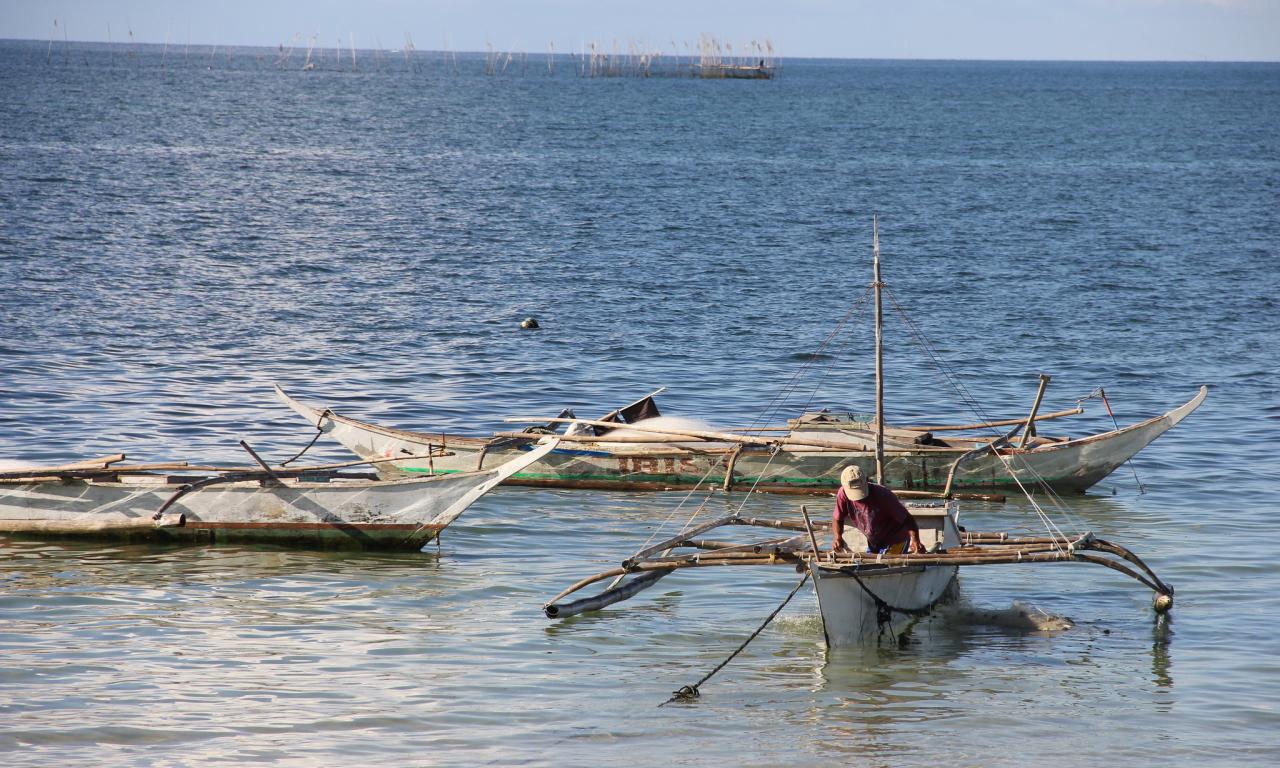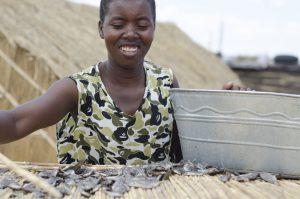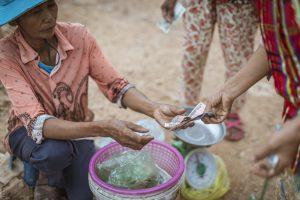
Employing a systems approach to build the resilience of all actors in aquatic food systems is essential to tackle the double-threat of climate change and COVID-19, said experts during a virtual dialogue hosted by WorldFish.
Aquatic foods play an important role as an affordable protein for nutrition and food security and in shifting global consumption away from high-carbon diets, crucial in accelerating the food systems transformation needed to keep global warming below 1.5 degrees above pre-industrial level. However, extreme weather events caused by climate change are impacting the potential of aquatic food systems, said panelists on the Virtual Dialogue: A Systems Approach for Climate-resilient and Inclusive Aquatic Foods on 11 September.
With millions of small-scale aquatic food producers across low-income countries facing a number of systemic challenges and threats, including lack of access to technology, market services and finance among others that inhibit their abilities to adapt to the impacts of climate change, researchers must shift to a holistic approach urged the three panelists from climate research, systems and development backgrounds called for an urgent shift to a holistic approach.
A holistic systems approach must see climate-resilient solutions in aquatic food production, marketing, and consumption that involves technical, institutional, and market actions, said Bruce Campbell, Director of the CGIAR Research Program on Climate Change, Agriculture and Food Security (CCAFS).
“Our globally connected world will be continuously affected by the dual-threat of climate change and COVID-19, but we must not make binary choices between the two. There must be the same pattern of action through allocating resources, funding, and investments,” he said.
“Without having this holistic vision and without involving all of the stakeholders in the solutions, we won’t be able to achieve what we need to,” Campbell told over 200 audience members research, NGO, government, and private sectors.
The complex and non-linear qualities of aquatic food systems require a prevailing shift away from separate efforts. Partnerships with multiple actors from varying networks are essential in generating knowledge and innovations to build the climate adaptive capacity of aquatic food systems, said WorldFish Climate Change Leader Essam Yassin Mohammed, who moderated the discussion.
The moderator championed the audience as the crucial multidisciplinary network needed to mobilize collective efforts around a global agenda for research and action on climate-resilient and inclusive aquatic food systems.
Watch the Virtual Dialogue: A Systems Approach for Climate-resilient and Inclusive Aquatic Foods
Inclusion is essential to climate-resilient aquatic food systems
Engaging all aquatic food system stakeholders from producers, processors, marketers, and consumers are key to build an enabling environment for resilience, said Saleemul Huq, Director of the International Centre for Climate Change & Development.
“When looking at vulnerable communities in Asia and Africa impacted by climate change, most of them are open water, freshwater, and small-scale fishers who are completely dependent on fisheries and aquaculture for their livelihoods,” explained Huq. “However, most often, they are just treated as the source of data rather than the benefactors of top-down policies and technologies, often being left out from the larger systems thinking.”
Policymakers, business leaders, and researchers must listen and work with the vulnerable, women, and youth on their livelihood needs to ensure inclusion and open-mindedness in decision-making processes, he indicated.
Simple, accessible, and affordable adaptive capacities are more inclusive and climate-responsive, said Editrudith Lukanga, Executive Director of the Environmental Management and Economic Development Organization.
“Empowerment and capacity enhancement of value chain actors, especially the vulnerable communities with limited adaptive capacities, particularly the women, youth, and poor men, must be prioritized. It is important for all of the elements; technology, finance, market, and climate services, to be joined together in one systematic approach,” said Lukanga.
“Vulnerable value chain actors cannot exist in isolation and must be empowered with climate-adaptive capacities,” she said.
Lukanga pointed to the example of climate risk-prone Lake Victoria, one of the African Great Lakes connecting Kenya, Tanzania and Uganda, where women who work in the post-harvest production sectors of small pelagic fish still rely on sunlight as a heat source and drying racks as part of the local processing and traditional drying techniques.
Without the capacity to resist heavy rainfall and unexpected flooding, the quality of their fish harvest will decrease, leading to considerable losses in the product. The closing of borders during COVID-19, they will be further disconnected from market services, business opportunities, and supply chains, she explained.
“These small-scale actors must be equipped with simple yet affordable technologies such as storage facilities, drying racks, and solar dryers to improve the processing, handling, and transporting of aquatic food products into markets at the right time and in good condition,” said Lukanga.

Creating an enabling environment in aquatic food systems
Investments and policy must enable market services and accessibility of suitable climate-smart technologies to create conditions for small-scale producers and value chain actors to withstand extreme weather while continuing to meet market demands, agreed Huq.
“Money must go to where it matters. Those who need it most must have access to finance to enhance their climate capacities to manage heightened risk during extreme weather events. Currently, of the insufficient finance available, only a tiny fraction of the money reaches the most vulnerable small-scale producers,” said Huq.
Investment is also needed for the virtual modality of communication and technological transformation. The roll out of improved climate information services to make weather updates easily accessible is imperative to inform small-scale weather events before heading to sea,” said Campbell.
Investing in simple information communication technologies such as mobile phone applications can also build the resilience of small-scale actors during COVID-19, allowing more opportunities for virtual stakeholder engagement and knowledge and skillset sharing while maintaining social distancing, the speakers suggested.

Related Posts:
- Video – Virtual Dialogue: A Systems Approach for Climate-resilient and Inclusive Aquatic Foods
- Video – A climate-resilient and inclusive aquatic foods system
- Blog – WorldFish climate change leader Essam Yassin Mohammed seeks a systems approach for resilient aquatic foods
- Blog – Only fair oceans can strengthen people and planet, argue researchers in a new report
- Webpage – WorldFish COVID-19 response
- Webpage – Earth Overshoot Day 2020
Related Publications:
- WorldFish Annual Report 2019
- The State of the World Fisheries and Aquaculture 2020, UNFAO
- Summary of the impacts of the COVID-19 pandemic on the fisheries and aquaculture sector, UNFAO
- Food Security and Nutrition Building a Global Narrative Towards 2030, Committee on World Food Security High-Level Panel of Experts
- Blue Foods Assessment by Stanford Center for Ocean Solutions, Stockholm Resilience Center, EAT Forum, WorldFish